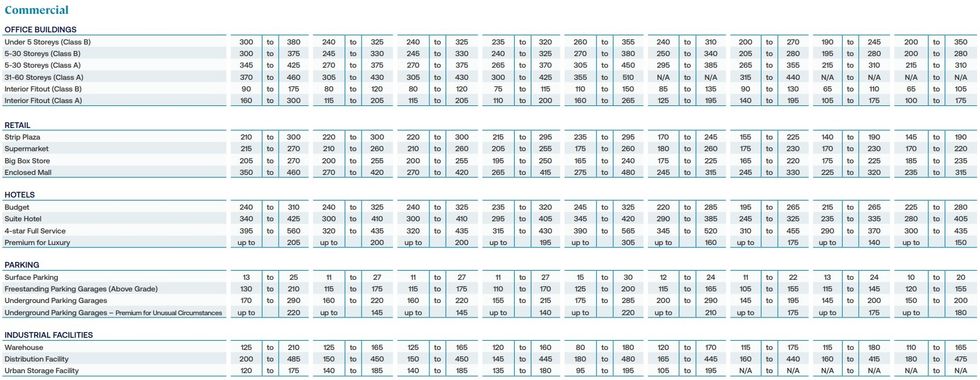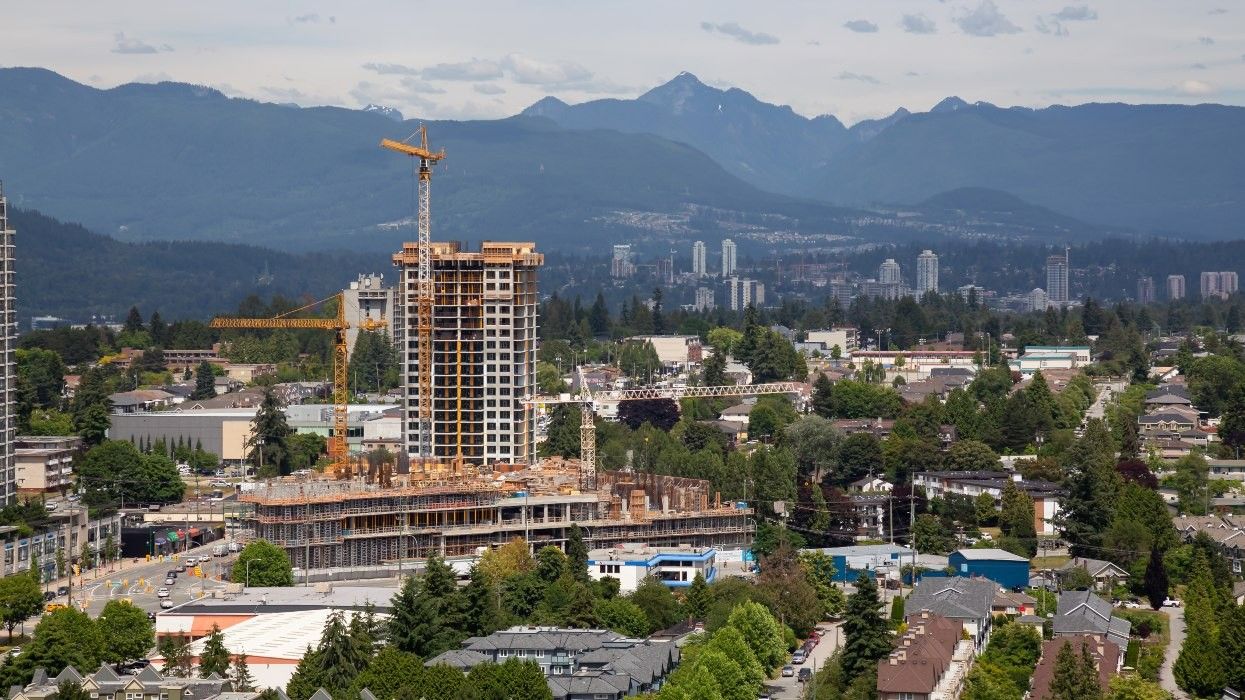In late-March, commercial real estate services company Altus Group (TSX: AIF) published their annual Canadian Cost Guide looking at construction costs across the country.
This year's report was based on proprietary cost data from over 6,200 projects — residential, commercial, and infrastructure — and the costs are broken down by both location and asset type. The guide factors in only hard construction costs, which means costs associated with site servicing, consultants, and development charges are not included.
The costs outlined in the guide are a reflection of a moment in time that can serve as a benchmark, rather than a forecast, but very notably, the cost ranges (as cost per sq. ft) for Vancouver are higher than those in every other market included in the report, almost across the board regardless of residential building type. (It is also generally true for most commercial building types.)
For concrete high-rise buildings between 13 and 39 storeys — one of the more common building forms in Metro Vancouver — the construction cost ranges from $360 to $455 per sq. ft. In every other market, including the Greater Toronto Area, the low end is closer to $300 and the high end is well below $400.
For six-storey woodframe buildings up to six storeys — another very common building form in Metro Vancouver — the construction cost ranges from $275 to $365 per sq. ft. Again, both the low end and high end are higher than those of every other market.
In fact, the only instanceu where construction costs exceeded that of Vancouver was townhouses in the GTA. There, construction costs for a three-storey stacked townhouse start at around $230 per sq. ft, which is just slightly higher than the $225 in Vancouver, although the high end for Vancouver remains higher. For row townhouses and single-family homes, the low ends for the GTA are about level with Vancouver, although the high ends in Vancouver remain substantially higher.


"You used to be able to build a building in Vancouver for less than $400 a square foot, and certainly $350 when it comes to above-grade, and now you can't," said Altus Group's Vancouver lead Christopher Mullins in an interview with STOREYS last week.
Asked why this is the case, Mullins pointed to policy changes and regulations, including requirements as it relates to building sustainability — such as the change from BC Energy Step Code 3 to Step Code 4 — and building performance — that necessitates high-performance glazing or a certain level of air-tightness. New seismic requirements are also having a big impact on construction costs and help explain the gap between Vancouver and BC, as BC is more seismically-vulnerable than Ontario and thus has more stringent requirements.
"The first part of the seismic design that has come also impacts below-grade [costs]," said Mullins. "You can see that some of the parking numbers are quite high and that's due to the excavation and environmental concerns. That seismic code is just coming out and evolving, but it is impacting some of the costs as well."
The cost of materials is high, but it's also high everywhere else, so the difference in costs between Vancouver and Toronto is better explained by the regulations, says Mullins. He also points to the labour as a key factor between Vancouver and Toronto.
"You can't forget about labour skill availability," he said. "We still have major projects in Vancouver like St. Paul's Hospital, like Oakridge Park, that require thousands of skilled operatives and the availability of labour still impacts some of the key trades like electrical and mechanical. There's a labour element in there too. I'm not saying that Ontario doesn't have a labour issue, but as a result of the slowdown in the condo market, there's more skilled labour available in Ontario than in BC, I would argue."
Construction costs have generally still been trending up since the pandemic, says Mullins, but price escalation has slowed. In recent years in Vancouver, we've seen about a 2% to 4% increase annually, which is relatively consistent for Vancouver.
Over the past year or so, the concerns regarding construction costs have also taken a back seat to concerns over other big costs, namely development cost charges (DCCs). More recently, the concerns have of course shifted to tariffs and sourcing.
"I think it's important to state," said Altus Group Head of Development Advisory - Americas Colin Doran, "that as much as we're talking about differences in construction costs, it's become less important when it comes to whether projects are feasible, because you've got all the other [factors] — government charges, demand, what we can achieve in revenue — that have a bigger impact on whether a project can move ahead or not."





















